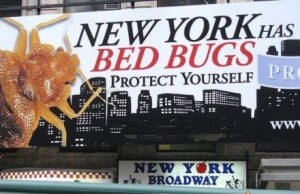Five things you should know about bed bugs
How to avoid unwanted roommates at school
Share

Cimex lectularius, the barely-visible beast that sucks human blood in the the night, has invaded our capital’s universities. Bed bugs have been found in residence rooms at both the University of Ottawa and Carleton University. But the truth is, they’ve invaded many more schools than that. “There isn’t a major university anywhere in North America that does not know this is a major problem,” Don McCarthy, president of Braemar Pest Control in Bedford, N.S. told Maclean’s last fall. It’s in the very nature of residences—the more transient a building’s population, the more likely the bugs will spread. Oh, and they can survive in the baseboards for many months without food. Scared yet? Don’t be. The best defense, says McCarthy, is old-fashioned education.
Here are five things every student should know about bed bugs:
1. You can’t get rid of them on your own. Over-the-counter sprays will only spread them around. Bed bugs are killed by professional treatments that include pesticides, exposure to extreme heat and major vacuuming. Pest control agencies will almost always tell you to put all of your clothing in the drier on high heat for a forty minutes to kill eggs and to then store it in plastic bags for weeks after treatment. They may also advise you to throw away books, furniture and mattresses.
2. Bed bugs don’t carry disease, so relax. Bed bugs can leave you with something that itches much like a mosquito bite. “But the mental problems are worse than the physical,” says McCarthy. Knowing you may be bitten can leave you anxious and without sleep. The upside, if you can call it that, is that the bugs aren’t known to transmit diseases. That will help you sleep easier, right?
3. You can protect your stuff. Keep your books and clothes in airtight plastic containers to keep bugs out. If you buy a new mattress, buy a new bed-bug cover too. It could end up saving you from throwing out your $800 bed-set. Protect your parents’ home by keeping your clothes in a plastic bag inside your suitcase and then dumping the contents straight into the drier when you go home.
4. Inspect your bed when you wash your sheets. Regular inspections can help you discover a problem before it spreads. Look for tiny brown stains that look like a ballpoint pen mark. It may be excrement. Blood stains indicate, well… The most common places bugs hide are inside tufts of mattresses, on box springs or inside wooden bed frames. Inspect those spots carefully. Don’t think because a place is clean that it can’t harbour the critters. “Bedbugs infect everywhere from slums to five-star hotels,” says McCarthy. Speaking of hotels, don’t forget to inspect those too.
5. Don’t buy used furniture or mattresses. There may be a reason that wooden desk was for sale at only $25 on Craigslist—its owner may have had bed bugs. “Even if you know what to look for, you might not see it,” says McCarthy. “So that old chesterfield is best avoided altogether.”